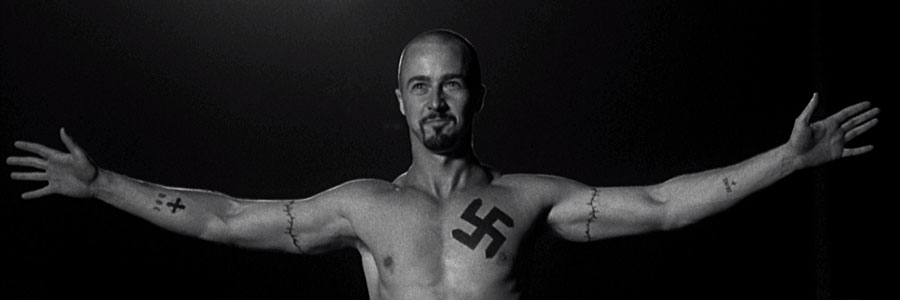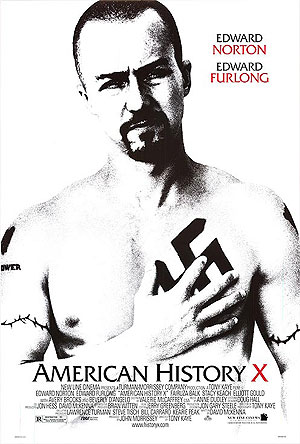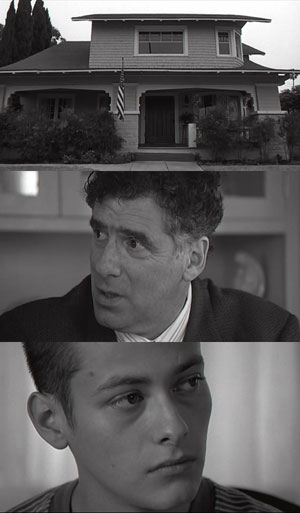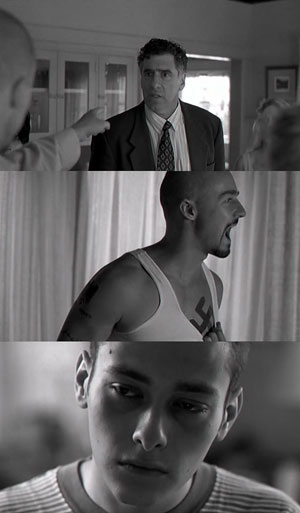
American History X
New Line Cinema
Original release: October 30th, 1998
Running time: 119 minutes
Director: Tony Kaye
Writer: David McKenna
Composer: Anne Dudley
Cast: Edward Norton, Edward Furlong, Fairuza Balk, Stacy Keach, Elliott Gould, Avery Brooks, Beverly D’Angelo
The Vinyards 0:40:32 to 0:48:44
Deconstructing Cinema: One Scene At A Time, the complete series so far

Family lunches can be dreadful, particularly if your family’s divided along political lines as mine is. Inevitably whenever we sit down as a family to eat together the discussion turns to something political and controversial and sure to stir up emotions and hot debate. Usually one member of the family will eventually end up saying something racist, sexist or homophobic and will then be severely rebuked by the rest of the people sitting around the table. Fortunately the matter will soon be resolved by the bigot being outnumbered and the rest of the family either shouting him down or simply arguing for a more liberal, sensible and considerably more pleasant viewpoint.
But what if the bigot at the table is articulate, intelligent and absolutely immoveable in his extreme right-wing politics? And what if this racist neo-Nazi psychopath is forced to endure an unwelcome Jewish man sitting at his table eating with his family. This is the scene that presents itself almost half way through American History X. Derek Vinyard (Edward Norton) is having lunch in his family home. His Mother Doris, sister Davina and little brother Danny (Edward Furlong) are all present. Derek sits at the head of the table where his father once sat, before he was killed in a shooting. Next to him sits his white supremacist girlfriend Stacey (Fairuza Balk) and next to her sits Murray (Elliot Gould) a Jewish teacher at the local high school and close friend of Doris. What begins as a pleasant meal and civilised conversation quickly descends into outright racism and finally violence.
American History X has a gripping non-linear structure with flashbacks of before Derek went to prison for the murder of some black youths mixed up with the present day scenes of the story where he’s been released from jail and is reformed after his experiences in prison. The dinner table scene is all presented in black and white signalling it’s a flashback. Danny’s voiceover warns the viewer ‘everyone was feeling so good that we just didn’t see it coming’ before we are thrust straight into the midst of a discussion.

American History X never shies away from using real life references to provoke emotional and intellectual responses from the audience. The dinner table conversation begins with talk of rioting. Murray appears in control of the conversation, as if he is educating Danny about why people riot. Doris mentions the Watts and Chicago riots of the 60s, calling them acts of rage against an oppressive society. Derek dismisses them as opportunism. Later the conversation moves to an explicit discussion of the Rodney King incident where a black man was beaten severely by police officers that had pulled him over for drink driving and the beating was caught on tape by an eye witness. These hot button topics are sure to get the audience edgy, their own views and memories of the controversies spring back to their minds. Derek’s girlfriend Stacey mentions the ‘scapegoat’ Chief Gates who eventually resigned after his leadership of the LAPD was repeatedly questioned in the wake of the Rodney King incident and the subsequent riots.
The script presses these buttons deliberately and confidently, knowing that audiences will be shocked and offended but that a minority may also get a kick out of hearing their own point of view being given so much time to be aired. The language used in the scene becomes slowly more provocative as Derek gets more and more angry and dominates the conversation. He goes from implicit hatred when discussing black people, repeatedly using the phrase ‘these people’ with contempt in his voice to all out racist language. He’s soon calling them ‘monkeys’ and as the conversation turns into physical confrontation with his family, Derek ends all hopes for a peaceful resolution by insulting Murray with every slur against Jewish people he can muster.
The tension built in the scene is absolutely palpable from start to finish. Due to earlier scenes, we know that Derek has a swastika tattoo. We know he has extremely racist views and that he’s capable of unspeakable violence and we can easily assume that he’s not going to put up with his mother bringing a Jewish man to the dinner table. From the first moments of the scene as Murray appears to dominate the conversation and teach Danny, we can see Derek silently raging. Edward Norton’s Oscar nominated performance is perfection. He stares at Murray with barely contained rage. He speaks knowledgably, confidently and articulately about the topics discussed and finally he becomes a vile monster before returning to be the caring family man again once he has eliminated the threat in his house. The devil is in the details of his performance. Aside from his lengthy, impassioned rants, Derek smirks at his mother for challenging him about police tactics. He taunts Murray with just a quick cocky grin and raise of the eyebrows. His physical presence becomes increasingly threatening as he moves from the head of the table to standing across the table from Murray, his shirt ripped off, tattoos on display and hate burning in his eyes.
However it’s not wholly Norton’s scene. Elliott Gould as Murray is noble, righteous and eventually completely defeated in the face of such monstrous hatred. He goes from teacher to listener, talker to defender and finally to victim in the scene. His presence is a constant source of anticipation for the audience as they know Derek and they know what mark lies on his chest. Every time Doris touches Murray, there’s  tension. Murray’s discomfort is made clear through the many close ups of Elliott Gould’s face as Derek speaks. The camera is often positioned behind Murray so we see much of the scene from his point of view, helping us to not only feel his discomfort but feel Derek directing his rant to Murray.
tension. Murray’s discomfort is made clear through the many close ups of Elliott Gould’s face as Derek speaks. The camera is often positioned behind Murray so we see much of the scene from his point of view, helping us to not only feel his discomfort but feel Derek directing his rant to Murray.
The entire scene is so perfectly constructed that it’s utterly believable. Starting out like any normal dinner table conversation, it’s the gradual escalation that makes it so gripping but also so completely plausible. The real life references, Derek’s quoting of statistics about black people in the penal system and Davina’s argument about social inequalities all ring true. Here is a family fighting over their differing opinions but with the added mix of two outsiders. Murray is the victim and Stacey is the antagonist who spurs Derek on. Predictably the heated discussion soon turns nastier with Davina insulting Derek by calling him ‘Mr Junior KKK’ a reference to the Ku Klux Klan. Both Doris and Davina try to escape from the escalating conversation. Doris tries to steer the conversation away from Rodney King and then leaves the room to get dessert and Davina finally asks to be excused after she has heard enough of Derek’s racism. This is when Derek gets really nasty and the confrontation turns physical. Force feeding Davina until she’s choking, Derek turns into an out of control, raging monster. Murray tries to stop him but is told to shut up. Doris and Danny both try to restrain Derek but he pushes them to the ground.
It’s here when the irrepressible wrath of Derek becomes fully clear. His violent rage now targets members of his own family. This is no longer just about racism; this is about pure hatred and anger. Derek is an unstoppable force fuelled only by fury. His girlfriend Stacey visibly enjoys watching him attacking his family. Everyone around him cowers in fear. Murray, the brunt of a vile racist rant finally leaves after Derek reveals his swastika tattoo and says this means ‘not welcome’.
The scene ends with Stacey saying ‘I’m proud of you’ to Derek, Doris admitting she is ‘ashamed’ of him and Danny revealing ‘I trust you Derek’. It shows the complete devastation of the family and the extent to which Derek’s hatred has reached. We see that Danny still trusts Derek and will likely follow in his footsteps and we fear for him. He watches Murray leave and his mother see him off. Doris is presented dropping to the curb in slow motion, the oppressive house in front of her, American flag waving. The prominence of the American flag when Murray leaves the house also hints at an agenda of the director Tony Kaye. Like racism is a central concern of This Is England, the flag seems to suggest that ‘This is America’. As if to back this up, Murray tells Doris ‘you don’t know the world your kids are living in’. This is a hellish vision of America where hatred is passed from father to son and even a family can be torn apart by racism and revulsion.

Pete Turner
Peter is a film and media lecturer and currently writing his PhD thesis on found footage horror movies. This means he must endure all sorts of cinema’s worst drivel in the name of academia. If that wasn’t punishing enough, Peter enjoys watching films with brutal violence, depressing themes and a healthy splash of tragedy.
If Peter isn’t watching films, he is writing about them, talking about them or daydreaming about them. He regularly contributes to Media Magazine and a range of film websites. You can find his film blog at www.ilovethatfilm.blogspot.com and follow him on Twitter @ilovethatfilm.
© 2022 STATIC MASS EMPORIUM . All Rights Reserved. Powered by METATEMPUS | creative.timeless.personal. | DISCLAIMER, TERMS & CONDITIONS
HOME | ABOUT | CONTACT | TWITTER | GOOGLE+ | FACEBOOK | TUMBLR | YOUTUBE | RSS FEED
CINEMA REVIEWS | BLU-RAY & DVD | THE EMPORIUM | DOCUMENTARIES | WORLD CINEMA | CULT MOVIES | INDIAN CINEMA | EARLY CINEMA
MOVIE CLASSICS | DECONSTRUCTING CINEMA | SOUNDTRACKS | INTERVIEWS | THE DIRECTOR’S CHAIR | JAPANESE CINEMA





